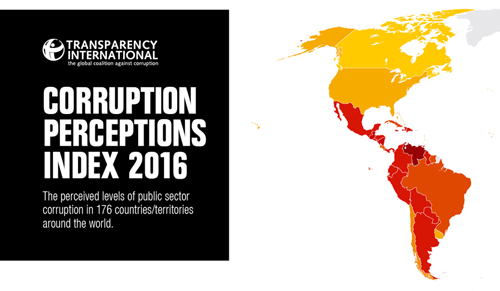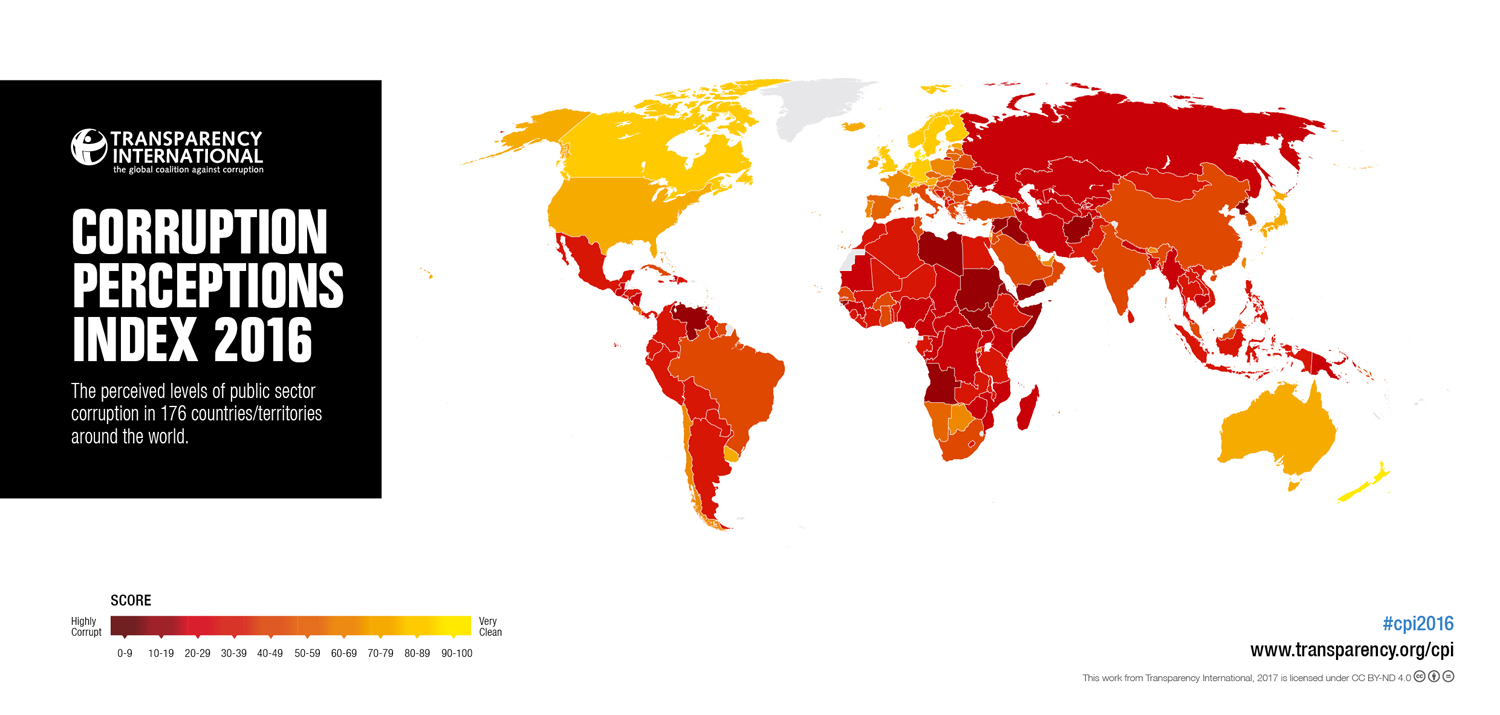
DAVID ADAMS reports on the findings of Transparency International’s latest Corruption Perceptions Index…
Corruption and inequality around the world feed off each other, according to anti-corruption organisation Transparency International which last week released its latest Corruption Perceptions Index showing corruption remains “endemic” in many nations.
The index, showed that some 69 per cent of the 176 nations included scored less than 50 on a scale ranging from 0 (perceived to be highly corrupt) to 100 (perceived to be very clean) with the global average sitting at a “failing grade” of just 43.

Denmark and New Zealand performed best with scores of 90, followed by Finland (89) and Sweden (88), but at the other end of the scale – where countries’ characterised by widespread impunity for corruption, poor governance and weak institutions – sits Somalia (10), South Sudan (11), North Korea (12) and Syria (13).
The UK is ranked equally with Germany and Luxembourg at number 10 on the list (81 points each), Australia sits at number 13 (79 points) and the US at number 18 (74 points). China comes in at number 79 with a score of just 40 – sharing the spot with India – and Russia sits at number 131 (just 29 points).
“We do not have the luxury of time. Corruption needs to be fought with urgency, so that the lives of people across the world improve.”
– José Ugaz, chairman of Transparency International
Transparency International say the result highlights the connection between corruption and inequality “which feed off each other to create a vicious circle between corruption, unequal distribution of power in society, and unequal distribution of wealth”.
José Ugaz, the organisation’s chairman, says that in too many countries, “people are deprived of their most basic needs and go to bed hungry every night because of corruption, while the powerful and corrupt enjoy lavish lifestyles with impunity.”
“We do not have the luxury of time. Corruption needs to be fought with urgency, so that the lives of people across the world improve.”
The organisation also says that the populism being seen in many nations around the world – in which people fed up by the empty promises of politicians to tackle corruption are instead turning to populist politicians who are undertaking to “change the system” – is likely to actually only exacerbate the issue.
“In countries with populist or autocratic leaders, we often see democracies in decline and a disturbing pattern of attempts to crack down on civil society, limit press freedom, and weaken the independence of the judiciary,” notes Mr Ugaz.
“Instead of tackling crony capitalism, those leaders usually install even worse forms of corrupt systems. Only where there is freedom of expression, transparency in all political processes and strong democratic institutions, can civil society and the media hold those in power to account and corruption be fought successfully.”
The index shows that the index scores of Hungary and Turkey – both nations which have seen the rise of autocratic leaders – have dropped in recent years while the ranking of Argentina, where a populist government has been ousted, has started to improve.
Overall, more countries declined rather than improved in their results this year – a factor with Transparency says shows the “urgent need” for committed action on corruption.
It describes lower ranked countries as being typically “plagued by untrustworthy and badly functioning public institutions like the police and judiciary” and that people there frequently face situations of bribery and extortion with basic services undermined by misappropriation of funds.
Higher ranked countries, on the other hand, tend to have higher degrees of press freedom, access to information about public expenditure, stronger standards of integrity for public officials and independent judiciaries.
The most substantial negative movements on the list have been seen in the Middle East including in Qatar, the nation which experienced the greatest negative movement on the index – down 10 points from 71 to 61, seeing it now ranked at number 31 on the list.
The most substantial negative movements on the list have been seen in the Middle East including in Qatar, the nation which experienced the greatest negative movement on the index – down 10 points from 71 to 61, seeing it now ranked at number 31 on the list.
“The FIFA scandals, the investigations into the decision to host the World Cup in 2022 in Qatar and reports of human rights abuses for migrant workers have clearly affected the perception of the country,”says Mr Ugaz.
Despite the drop, however, Qatar remains something of a rarity in the Middle East where more than 90 per cent of Arab countries scored less than 50.
Among the few countries that improved their ranking on the list was Tunisia where, according to Transparency, the government took some serious anti-corruption steps last year including enacting new laws and adopting a national strategy against corruption. Tunisia sits at number 75 on the list with 41 points.
In Asia-Pacific, Transparency says that as well as China and India, Australia was on the “watch list”, its performance marred by recent foreign bribery scandals and “threats to independent institutions” such as the Australia Human Rights Commission.
It noted that the integrity and credibility of AHRC president, Gillian Trigg, was “unrelentingly attacked” following the publication of a report on physical and sexual abuse in asylum seeker detention centres.
Other nations to watch in the region include the Philippines, Malaysia and South Korea.
Meanwhile, Transparency said that 2016 was a “good year” in the fight against corruption in the Americas thanks in part to the revelations of the Panama Papers – which revealed how a Panamanian law firm had helped set up thousands of secret shell companies, many of which were used by “corrupt politicians, criminals and tax abusers around the world”.





